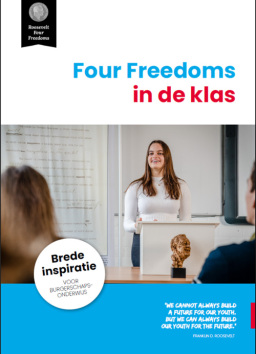The Four Freedoms at the RIAS
Franklin Roosevelt’s Four Freedoms occupy a central place in the history and work of the RIAS. Enumerated by FDR in his 1941 State of the Union address, these four interlinked ideas – Freedom of Speech, Freedom of Worship, Freedom from Want, and Freedom from Fear – formed the pillars of the Rooseveltian vision for the post-war world. They went on to inspire the creation of the United Nations and the Universal Declaration of Human Rights.

The Four Freedoms in the Classroom
What does it mean to live in a free society?And what happens when one person’s idea of freedom clashes with that of others? Political debate is suffused with references to “freedom” – but what do we actually mean by it?
In the autumn of 2020, guest teachers from the RIAS, University College Roosevelt (UCR), and other local partners toured the high schools of Zeeland with an outreach program centred around the meaning of freedom in the age of Covid, climate change, and Black Lives Matter. Collectively they taught a series of classes, touching on history, rhetoric, citizenship, and politics. These efforts were subsequently bundled in the (Dutch-language) booklet, Four Freedoms in de Klas .
Containing lesson plans, including a detailed plan to simulate the founding of the United Nations in the classroom, Four Freedoms in de Klas is an inspirational guide to teaching the legacy of the Roosevelts, embedded in the challenges of our contemporary society.



